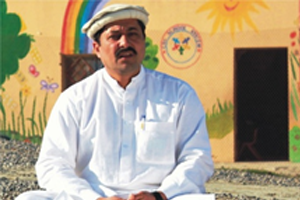“Baba, look at my uniform! I am drenched in sweat,” said the daughter of Zaman Khan, the naib nazim of Katti Garhi Union Council in Mardan district, after returning from school one day. It motivated the 36-year-old father of four to approach the authorities for the electricity provision at the Girls’ Primary School, Katti Garhi. Within three months, his efforts bore fruit as the school got electricity for the first time since its inception 25 years ago.
For the people hailing from under-developed areas like Katti Garhi, life is a continuous struggle. Zaman contested for the seat of Katti Garhi Union Council naib nazim in the May 2015 local government elections for overcoming the challenges being faced by his community, especially poor service delivery in the areas of health, education, and sanitation.

Zaman, after being elected, wanted to solve the problems of his constituents and restore their confidence in democracy by ensuring quality service delivery at the grassroots level. However, he initially failed to achieve anything remarkable because of his lack of understanding about the local government system.
Fortunately, things changed for Zaman after he got an opportunity to attend the training sessions organized by USAID Citizens’ Voice Project (CVP) for the capacity-building of elected local government representatives from five selected districts of Khyber Pakhtunkhwa on three broad areas: (i) Khyber Pakhtunkhwa Local Government Laws, Structure and Functions; (ii) Resource Management and Transparent Budgeting; and (iii) Participatory Development Planning.
“The USAID CVP training sessions were indeed a great help. They taught us how to express ourselves and communicate with our constituents, as well as the ways and means to get the problems of our communities solved by public departments concerned,” Zaman says.
Soon, first real success as a public office holder came Zaman’s way. Based on what the naib nazim had learnt during the training sessions, he advocated with community members and took local leaders onboard to successfully advocate with the authorities concerned for the provision of electricity in Girls’ Primary School Katti Garhi.
Zaman’s desire to improve educational facilities in his union council did not end here. Recognizing the security hazard being posed by the deteriorating boundary wall of Girls’ Primary School Katti Garhi, he lobbied with community leaders and took up the matter with the Khyber Pakhtunkhwa Education Department. His campaign led to the allocation of funds for the reconstruction of the school’s boundary wall, making students safer at the school and making Zaman win the community’s respect.
Zaman’s services to his community have led to the restoration of citizens’ confidence in public services. He credits the training sessions organized by USAID CVP for this. “The most memorable moment for me was when I handed over the electricity meter for the school to community elders while everyone was cheering,” he says.




















